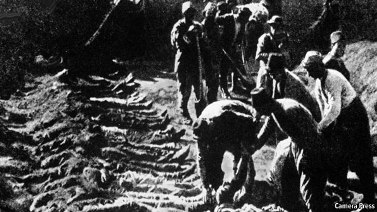
 Both Turkey and the Armenian diaspora should look for ways of rewriting a familiar script
Both Turkey and the Armenian diaspora should look for ways of rewriting a familiar script
NOT for the first time, Armenians sense a moment of vindication in their struggle for the acknowledgment of the tragedy that befell their forebears during the first world war. Turkey is angry. And America?s administration is straining to limit the damage.
The latest Turkish-American rift over the Armenian question?after a congressional committee voted on March 4th to recognise the killings of 1915 as genocide?looks wider than some previous ones. It coincides with a general scratchiness between America and its ally. Turkey is reluctant to slap sanctions on Iran. Anti-Americanism is running high among Turks. Some suspect that Barack Obama retains his view (expressed as a senator in 2008) that ?the Armenian genocide is not an allegation?but rather a widely documented fact.?
Still, the chances are that after a deep sulk, Turkey will send its ambassador back to Washington, and the administration will persuade legislators to avoid a vote in the full House, for fear of wrecking an important relationship?and worsening the fading prospects for reconciliation between Turkey and Armenia. A tired diplomatic ritual will play out once again.
A happier ending?
Can any actor in this sorry drama do anything to improve the script? One day a Turkish leader will be statesman enough to see that national dignity is better served by acknowledging the sins committed on Anatolian soil than by suppressing debate and punishing truth-tellers. Such a leader could decouple relations with Armenia from Ottoman history. (In any case, their argument today is more about the aftermath of the war over Nagorno-Karabakh in the 1990s than over 1915.)
Some people in Turkey realise this. As one Turkish columnist has noted, for Turkey to be so touchy about the minutiae of a congressional vote betrays weakness, not strength. And nothing would silence Turkey?s detractors more than a genuine, no-holds-barred effort to probe the events of 1915. The result of the Armenian deportations is indisputably and horrifically clear: hundreds of thousands, probably more than a million, died. But there is room for scholarly inquiry into the working of the murky state machinery that led to that outcome?to determine whether the tragedy was principally the result of murderous design or culpable neglect. By inviting all scholars to peruse its archives (something it has done only patchily), Turkey could disarm its critics.
For Armenians, securing recognition of their ancestors? fate is a sacred cause. They can hardly be expected to set aside their bitter memories because (as the heads of five big firms have complained) American arms exports are at risk. Nor will Armenians accept the argument that assessing the slaughter of 1915 is the work of scholars not of political authorities, executive or legislative. As State Department records show, the American government of the time analysed those events and it had no doubt that ?extermination? was the aim.
But if Armenians want to boost the chances that the authorities in Ankara will eventually allow a searching look at one of the 20th century?s darkest episodes, they might think harder about their congressional campaign. More than at any time since the modern republic was founded in 1923, Turkish society is questioning received truths (see article and article). That is mainly thanks to writers, journalists and citizens who risk their skins to campaign for a more honest approach to history. Among the finest of these was Hrant Dink, an ethnic Armenian editor who was murdered in 2007. He worked for a broad reconciliation between the Turks and Armenians, including the recovery of historical truth, but not confined to it.
In his view, and that of other Turkish citizens who work for historical justice, pressure from Congress could make the truth more elusive by stiffening the backs of nationalists. Even among Turks who believe that the slaughter of 1915 qualifies as genocide, there is a sense that mentioning the g-word in a congressional resolution works against them.
If Turkey were a totalitarian state, there would be no case for Armenian self-restraint. But precisely because Turkey is an (albeit imperfect) democracy, the emphasis should be on giving Turks the best possible chance to face up to their own past. Instead of telling Turks what to think, Armenians should urge the authorities to promote inquiry within Turkey, starting with an end to measures such as article 301 (which criminalises ?insults to the Turkish nation?). The idea of a stronger, healthier Turkish democracy may puzzle some Armenians; but it is the best way to bring about the honesty for which they yearn.
Source: The Economist, 11 March 2010
http://www.economist.com/opinion/displaystory.cfm?story_id=15663510

For the record: it was genocide, by the modern definition. Does it matter now? It's time for the Armenians to forget it and for the Turks to forget it too. It was a long time ago and it does no one any service to keep harping on about it. Why Congress wants to bring the matter up again is beyond me. The effort required on each side will be equal. The Turkish state will not admit to genocide, despite the evidence. The Armenians will not pipe down despite the genocide affecting the current descendants not one iota. Relations suffer in the meantime. It could go on forever and it wouldn't really matter. To be absolutely realistic about this, Armenia has to give Turkey a reason to care. It's difficult to think of one.